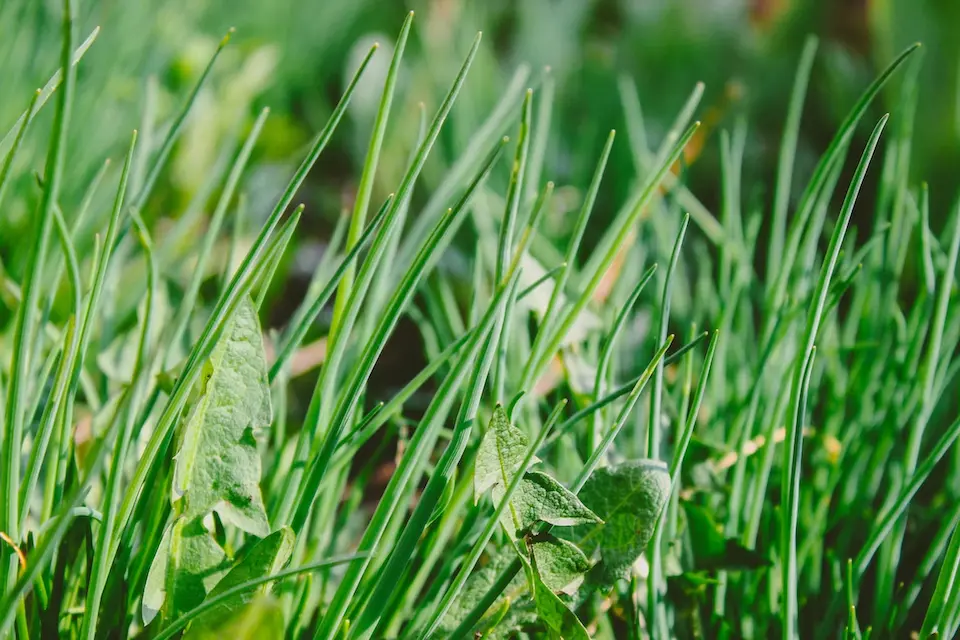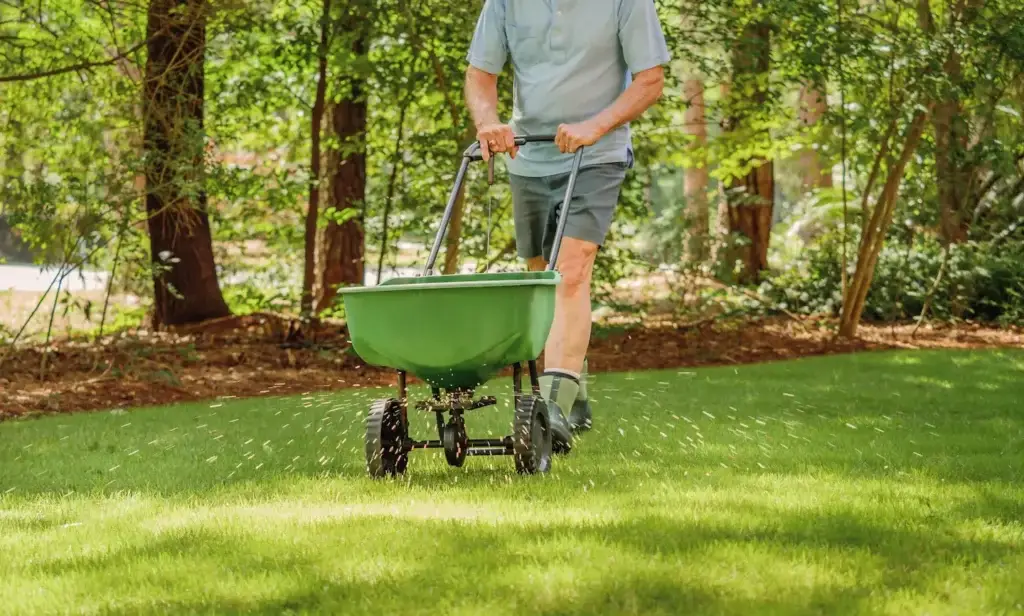
Maintaining a lush, healthy lawn can be a challenge in North Carolina, especially when weeds threaten to invade and choke out the grass. One of the most effective ways to control weeds is by using pre-emergent herbicides. These specialized chemicals prevent weed seeds from germinating, ensuring that they never become a problem in the first place. However, as a homeowner, you may wonder, when is the best time to apply a pre-emergent herbicide in North Carolina?
Our Wake Forest lawn fertilization and weed control experts are here to help you take a closer look at the factors that determine the timing of pre-emergent herbicide application and provide you with some tips on how to achieve effective weed control in your lawn.
What are Pre-Emergent Herbicides and How Do They Work?
Pre-emergent herbicides are a type of weed control product that is applied to lawns and gardens before weed seeds have a chance to germinate. These herbicides work by creating a chemical barrier in the soil that prevents the roots of newly sprouted weeds from developing properly. This, in turn, stops the weed from growing and ultimately causes it to die off.
Unlike post-emergent herbicides, which are used to kill existing weeds, pre-emergent herbicides are designed to be preventative and are most effective when applied before weeds have a chance to take root. By stopping weeds from growing in the first place, pre-emergent herbicides can help keep lawns and gardens looking healthy and vibrant while reducing the need for time-consuming and costly weed removal.
Benefits of Pre-Emergent Weed Control
Some benefits of Pre-Emergent Weed Control are:
- Prevents weed growth: Pre-emergent herbicides create a chemical barrier that prevents weed seeds from germinating, stopping weed growth before it starts.
- Reduces weed population: By stopping the growth of weeds before they emerge, pre-emergent herbicides can reduce the overall population of weeds in your lawn or garden over time.
- Cost-effective: Pre-emergent weed control can be a cost-effective method of weed management, as it can reduce the need for expensive post-emergent herbicides and time-consuming manual weed removal.
- Environmentally friendly: Pre-emergent herbicides can be less harmful to the environment and beneficial to plants than post-emergent herbicides, as they are applied before weeds have emerged and have less opportunity to impact non-target plants.
Limitations of Pre-Emergent Weed Control
In addition to its benefits, pre-emergent weed control solutions have several limitations, including:
- Timing is critical: Pre-emergent herbicides must be applied at the right time for maximum effectiveness. If applied too early or too late, they may not work as well, which can result in weeds growing and competing with your lawn or garden plants.
- Limited effectiveness: Pre-emergent herbicides only target weed seeds that have not yet germinated. They will not control weeds that have already started to grow, which may require additional treatment.
- Limited weed spectrum: Pre-emergent herbicides are effective only against certain types of weeds. They may not be effective against all weed species, which may require additional management techniques.
- Soil impact: Pre-emergent herbicides can have an impact on the soil, which can affect beneficial microbes and other organisms. Overuse or misuse of pre-emergent herbicides can lead to soil degradation and long-term damage to the ecosystem.
How Long Does Pre-Emergent Weed Control Last?
The duration of pre-emergent weed control can vary depending on several factors, including the type of pre-emergent herbicide used, the application rate, and environmental conditions. In general, pre-emergent herbicides can provide weed control for several months, but their effectiveness will eventually wear off.
Most pre-emergent herbicides are designed to last for a period of 3 to 6 months, but this can vary depending on the specific product used. Some products may provide longer-lasting control, while others may have a shorter duration of effectiveness.
When to Apply Pre-Emergent Herbicides for Effective Weed Control
The timing of pre-emergent herbicide application is critical to its effectiveness in controlling weeds. For the most effective weed control, pre-emergent herbicides should be applied before weed seeds have a chance to germinate. In North Carolina, the ideal time to apply pre-emergent herbicides is during your early spring lawn care, before soil temperatures reach 55-60 degrees Fahrenheit. This timing will vary depending on the specific region of North Carolina and weather patterns, but generally, it is recommended to apply pre-emergent herbicides in late February or early March.

Understanding the Weed Life Cycle and Growth Stages
Understanding the weed life cycle and growth stages is essential for effective weed management, including the use of pre-emergent herbicides.
The weed life cycle can be divided into several growth stages, each with its own characteristics and management considerations:
- Germination: This is the first stage of the weed life cycle, where the seed begins to grow roots and shoots. During this stage, the weed seed absorbs water and nutrients from the soil, allowing it to grow.
- Seedling: In this stage, the weed grows its first set of true leaves and begins to establish a root system. Seedlings are often more susceptible to herbicides and other weed management techniques, as they are not yet well-established.
- Vegetative: During this stage, the weed continues to grow and develop its root system. The plant may produce additional leaves and stems, and may begin to flower.
- Reproductive: In this stage, the weed produces flowers and seeds, which can then be dispersed to other areas. This is the most critical stage for weed management, as controlling seed production can help prevent future weed infestations.

Factors to Consider Before Applying Pre-Emergent Herbicide
Before applying pre-emergent herbicide, it’s important to consider several factors to ensure that the herbicide is effective and applied safely.
Target Weed Species
Pre-emergent herbicides may not be effective against all weed species. It’s important to identify the target weed species and choose a herbicide that is labeled for that particular weed.
Weather Conditions
The timing of pre-emergent herbicide application is critical for effective weed control. It’s important to apply the herbicide when soil temperatures are at the appropriate level for weed seed germination. Rainfall and irrigation can also impact herbicide effectiveness.
Soil Conditions
The soil condition should be taken into account when applying a pre-emergent herbicide. If the soil is compacted or has poor drainage, the herbicide may not be distributed evenly, reducing its effectiveness.
Lawn or Garden Health
It’s important to consider the health of the lawn or garden before applying a pre-emergent herbicide. If the lawn or garden is already stressed, applying herbicide may further damage the plants.
Application Method
Pre-emergent herbicides can be applied using various methods, including granules or liquid spray. It’s important to choose the appropriate method for the target area and follow the label instructions carefully to ensure proper application.
Safety Precautions
Pre-emergent herbicides can be toxic to humans and pets if ingested or inhaled. It’s important to wear appropriate protective gear, such as gloves and a mask, and to keep children and pets away from the treated area until the herbicide has dried.
Pre-emergent herbicide FAQs
Can pre-emergent herbicides harm my plants?
Pre-emergent herbicides can harm plants if not used correctly or applied at an inappropriate time. While pre-emergent herbicides are designed to prevent weed seeds from germinating, they can also inhibit the growth of other plants if applied incorrectly.
One of the most common causes of plant damage from pre-emergent herbicides is over-application or improper application. Over-application can lead to herbicide concentrations that are too high, which can damage plants or even kill them. Improper application, such as spraying herbicide on leaves or stems, can also damage or kill plants.
When is the best time to apply a pre-emergent herbicide in NC?
the best time to apply a pre-emergent herbicide in NC is typically in the early spring before soil temperatures reach 55-60 degrees Fahrenheit. By applying pre-emergent herbicides at the right time and using them as part of an integrated weed management strategy, you can help keep your lawn or garden free of weeds and looking healthy and vibrant.
What if I miss the optimal pre-emergent herbicide application window?
If you miss the optimal pre-emergent herbicide application window, there are still several options available for weed control. One option is to use post-emergent herbicides, which are designed to control weeds that have already begun to grow. Post-emergent herbicides can be effective in controlling existing weeds, but they may require multiple applications to fully eradicate the weed population.
Another option is to use cultural practices, such as mowing and hand-weeding, to control weeds. Mowing can help prevent weed seed production, while hand-weeding can remove weeds manually. These methods can be time-consuming, but they can be effective in reducing weed populations.
Our Lawn Care Professionals are Available to Care for Your Raleigh, NC Lawn!
Don’t let weeds take over your Raleigh, NC lawn! Our lawn care professionals at FortSmith Landscaping are available to provide top-notch care for your lawn, including the application of pre-emergent herbicides. By applying pre-emergent herbicides at the optimal time, we can prevent weed seeds from germinating and keep your lawn healthy and beautiful all season long.
Don’t wait until it’s too late – contact us today to schedule your lawn care services and ensure your lawn is looking its best by calling (919) 228-8495 or filling out the contact form below to get started.
